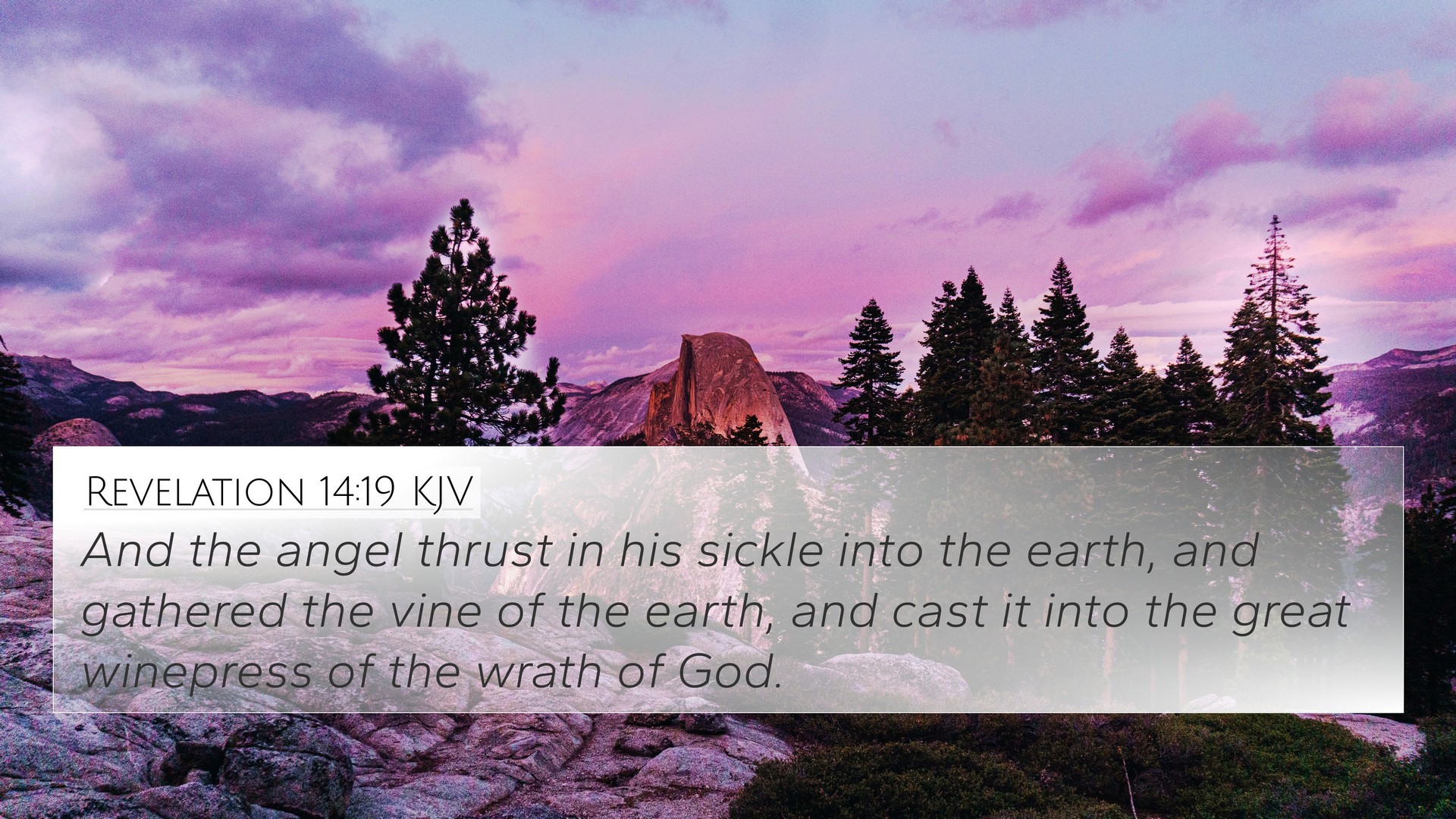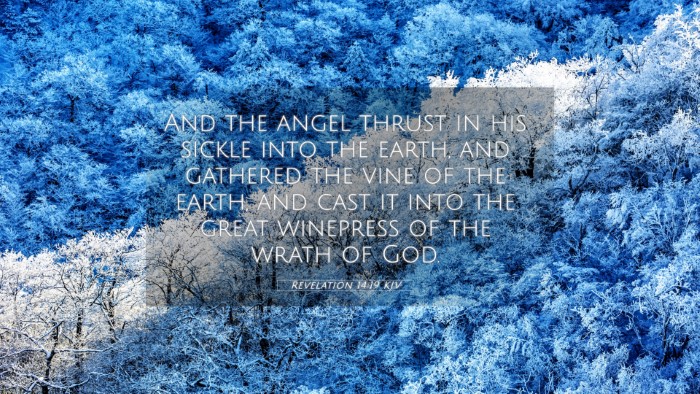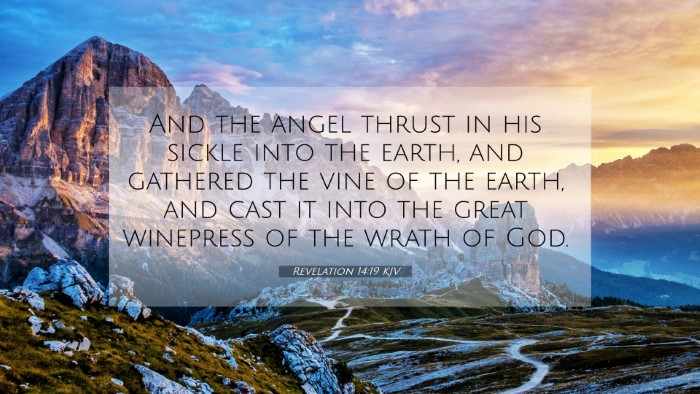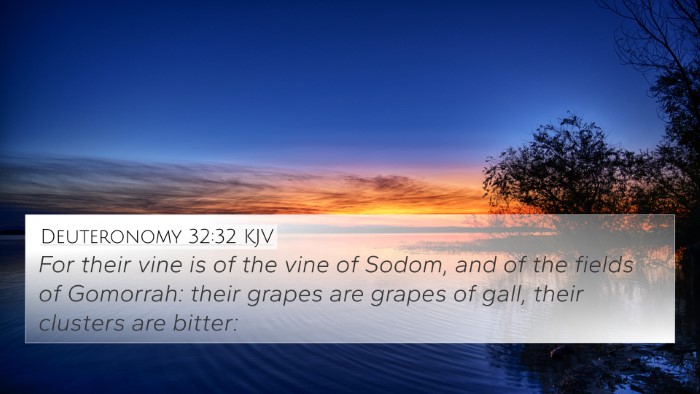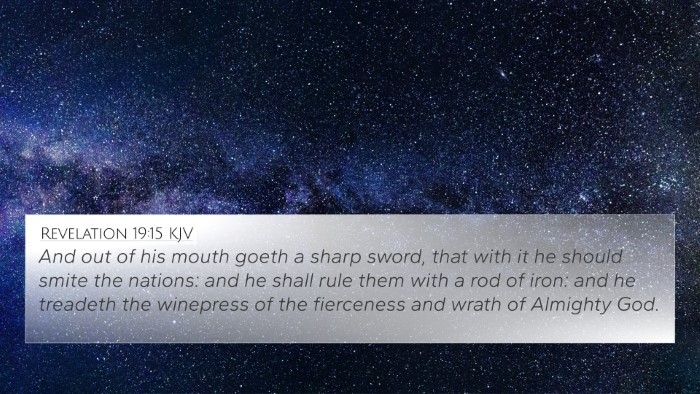Understanding Revelation 14:19
Revelation 14:19 states:
"And the angel thrust in his sickle into the earth, and gathered the vine of the earth, and cast it into the great winepress of the wrath of God."
Summarized Meaning from Commentaries
This verse depicts the final judgment portrayed through vivid imagery of a harvest. Several key themes emerge from this passage, providing rich theological insights:
- Imagery of Harvest: The harvesting of the vine symbolizes the gathering of those who have not adhered to God's will. Commentators like Matthew Henry emphasize that this imagery reflects a time of reaping what was sown, both in terms of deeds and faith.
- Divine Wrath: The 'great winepress of the wrath of God' signifies the serious consequences of a life lived against God's commandments. Albert Barnes elucidates that this represents not only judgment but also God's righteous indignation against sin.
- Role of Angels: The angel's action of thrusting in the sickle demonstrates God's authority and the involvement of divine beings in executing His justice. Adam Clarke highlights the active participation of heaven in the earthly affairs of judgment.
- The Vinedresser's Authority: The harvesting reinforces the notion of God as the ultimate vinedresser who decides the fate of humanity based on spiritual fruitfulness or lack thereof.
Cross-References for Revelation 14:19
To further understand this verse, one can explore various cross-references found throughout the Bible:
- Matthew 13:30: "Let both grow together until the harvest." - This verse establishes the timing and process of divine judgment.
- John 15:2: "Every branch in Me that does not bear fruit He takes away." - This underscores the theme of fruitfulness essential for divine approval.
- Joel 3:13: "Put in the sickle, for the harvest is ripe." - This Old Testament prophetic text echoes the urgency of God's judgment.
- Isaiah 63:3: "I have trodden the winepress alone..." - Here we see a direct reference to the imagery of the winepress related to divine judgment.
- Revelation 19:15: "He treads the winepress of the fury of the wrath of God Almighty." - Further insight into God's ultimate justice through Jesus Christ.
- Matthew 24:31: "And He will send His angels with a loud trumpet call, and they will gather His elect..." - This verse illustrates the divine gathering aspect from both the righteous and the unrighteous.
- Romans 2:6: "He will repay each person according to what they have done." - Reflecting the principle of divine recompense at the harvest time.
- Galatians 6:7: "A man reaps what he sows." - This adds to the understanding of sowing and reaping as key biblical principles central to the judgment theme.
- Revelation 14:15: "Thrust in your sickle and reap, for the time to reap has come..." - Provides context for understanding the timing and action of judgment.
- Revelation 6:17: "For the great day of their wrath has come, and who can stand?" - This reinforces the urgency and seriousness of divine judgment present throughout Revelation.
Connecting Themes in Scripture
The thematic connections can be drawn from Revelation 14:19 to other scriptures, offering deeper insights:
- Judgment: Connections can be made to the Old Testament writings (Amos 9:13, Micah 4:12), which parallel the vine and the harvest with God's impending judgment.
- Harvest as a Metaphor: The metaphor of the harvest spans the entirety of scripture, seen in John 4:35 where Jesus mentions the fields being ready for harvest.
- Divine Justice: The recurring theme of divine justice can be traced to the Psalms (Psalm 7:11) illustrating God's righteous disposition against sin.
Utilizing Cross-References in Bible Study
For those engaging in a thorough study of this verse and its implications, exploring cross-references is vital. Here are tools and methods to enhance your understanding:
- Bible Concordance: This tool helps you find specific words and themes across various verses, aiding in thematic connections and deeper study.
- Bible Cross-Reference Guide: A guide that links similar themes and concepts located in different parts of the Bible.
- Cross-Reference Study Methods: Techniques for comparing parallel accounts, especially within the Gospels and epistles to grasp context and theological insights.
Conclusion
Revelation 14:19 serves as a stark reminder of the certainty of God's judgment and the seriousness of being spiritually fruitful. By engaging with cross-references and related scripture, believers can build a comprehensive understanding of God's messages about justice, accountability, and salvation throughout the Bible.
